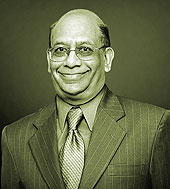 |
Northeast India is in popular perception the land of the seven sisters — the seven hilly states, abundant in natural resources but devoid of industries. It was therefore a surprise to run into an entrepreneur whose roots are in Meghalaya’s capital, Shillong. Meet B.K. Bawri, founder-chairman and managing director of the BK Group.
“My forefathers from Rajasthan settled in Shillong around 130 years back,” says Bawri. “They were traders. But when I grew up, I knew I had to diversify into something different altogether.”
He has tried hard to be different. Bawri’s schooling was at St Edmunds run by Irish brothers. He graduated from St Anthony with economics honours in 1968. He explains how he acquired a broader horizon. “In 1962, my father got me a single copy of The Economic Times. I have been its reader ever since,” says Bawri. “The paper was my window to the world. It listed opportunities in various sectors.”
Bawri initially joined his father’s business. They were distributors for ITC products in the northeast region. In 1969, he started Meghalaya Plywoods, which he managed till 1985. In 1980, while working for the company, he wrote a short paper where he listed some pointers for the senior management to follow. Says Bawri, “I wrote that people are the most important resource and the customer is king. For my family, this was completely unheard of. My paper was quietly kept aside.”
In 1985, the family business underwent a major restructuring, in which his business was handed over to his cousins, while Bawri ventured into the uncharted territory of cement. According to him, in the mid-80s, despite the raw material to make cement being available, cement was always brought from outside. Bawri decided to change this but faced many hurdles. The primary among them was human resources. Also, as Bawri puts it, “I was not a B-school graduate, and learnt management the hard way in the absence of a mentor.”
Somehow the team was put up. Bawri recalls that at first, their factory was utilising only 12 per cent of the total capacity. To stabilise operations, Bawri had given the project to a turnkey consultant. However the consultant abandoned the project midway leaving Bawri to do the rescue job. Says Bawri, “It took us three years to stabilise the plant, but once that was done, there was no looking back.”
The company put in another unit. Today, Vinay Cements, as Bawri’s baby is called, is one of the four largest brands in the northeast region. Bawri claims that the processes utilised in the company are comparable to the best cement companies in the world and that too at only one-third of their cost.
Bawri believes in certain maxims in his professional life. Says he, “Companies that have their fundamentals correct will always grow.” According to him, the fundamentals in any organisation are people, processes and execution of projects. One needs to constantly add value to the fundamentals, he adds.
After chasing professional goals for more than 20 years, Bawri now takes some time off to read and play golf. He has been the president of the Assam Chamber of Commerce. He has also served as an executive member of the CII (northeast region).
Apart from all this, Bawri has a unique habit. Every month, he publishes 1,000 copies of the synopsis of a good book and sends them to people in politics, the media, bureaucracy, the judiciary and the intelligentsia. Explains he, “I believe that any policy for the country is decided by this combination of people. I send them the synopsis in the hope that good books will guide them to frame favourable policies for the country.” He has been appreciated in both academic and political circles for his initiative.
Bawri has also set up a non-governmental organisation for children of the Northeast. The organisation has its presence in the metros where students from the Northeast go for their studies. To make sure that students do not miss home when they are away, this organisation takes care of their needs. Just like Bawri, who may have relocated to Calcutta, but whose heart lies in Shillong.
Based on a conversation with Aparna Harish in Calcutta










